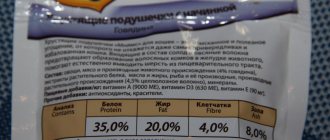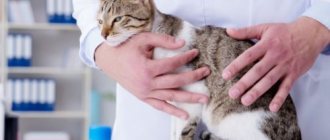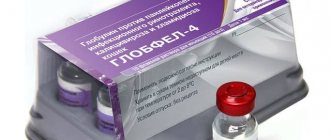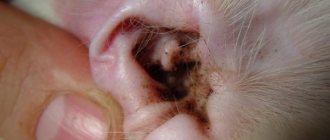If you plan to make your pet a show career, if your cat walks along the street (in the city, in the country, in the forest or park), and also if you plan to travel anywhere with your animal, then it is necessary to vaccinate such an animal.
If you bought a cat “as a pet” (that is, you will not do breeding work), if he does not have a street walk, then vaccinations are still very advisable, since the infection can easily be brought on shoes or picked up from a flea bite.
Content
1. General description 2. Composition and action 3. Vaccination rules 4. Restrictions and side effects 5. Analogues and prices 6. Reviews
Calcivirosis, viral rhinotracheitis, panleukopenia (distemper) are infectious diseases that often cause the death of pets. Only timely vaccination can protect the animal’s body and reduce the risk of infection or alleviate the symptoms of the disease. Felocel is a vaccine for cats that protects the body from three dangerous infections at once.
WHAT VACCINATIONS ARE CATS, KITTENS, AND KITTENS GIVEN? WHAT DO VACCINATIONS PROTECT FROM?
We list exactly what vaccinations (as well as mandatory preventive measures) are given to cats and adult cats and kittens:
- Deworming (deworming kittens)
- For infectious viral diseases (panleukopenia, rhinotracheitis, calicivirosis, chlamydia, viral leukemia, FIP)
- For rabies
- Prevention of fleas, ticks and other parasites
Let's take a closer look at each specific vaccination, its features, methods of infecting an animal and the immediate harm it can cause. Please read the information carefully and decide which vaccinations your kitten/cat needs.
| Cat diseases | Mandatory vaccinations | Defeat | Infection |
| Panleukopenia (distemper, feline infectious gastroenteritis, parvovirus enteritis) | + | A very contagious, acute infection that is difficult to tolerate. Possible fatalities. Sharply reduces the number of bloody white cells (leukocytes) (white blood cells) in the animal's blood. | - direct contact with an infected cat - through household/interior items - by airborne droplets - infection of kittens in utero through a sick mother cat - through sexual contact - blood-sucking insects - through clothes/shoes from the street - people who have been in contact with sick kittens and cats - in veterinary clinics where there may be infected animals |
| Rhinotracheitis (feline herpes) | + | A complex viral disease that affects the respiratory tract (organs responsible for breathing) and the eyes of cats. Lethal outcomes in 5-20% of cases. | |
| Calicivirus | + | Affects the respiratory system, eyes, mucous membranes. Causes lameness in cats. | |
| Chlamydia | Very desirable. When breeding and mating - a must! | The genitourinary system and gastrointestinal tract are affected. The disease also causes rhinitis and conjunctivitis. | - direct contact - airborne droplets - through sexual contact - through fleas/ticks - small rodents Recovered animals are also carriers of this disease. |
| Rabies | Very desirable. For show animals traveling abroad - a must! | The animal's nervous system is affected. Rabies infection is fatal in almost 100% of cases. | - bite of an infected cat - through saliva - eating small sick rodents |
| viral leukemia (leukemia, leukemia, lymphosarcoma, FeLV, FLV) | There are currently no vaccines | The natural immune system is suppressed. Malignant formations (tumors, oncology) appear, the tonsils, lymphatic system, circulatory system, and bone marrow are affected. High percentage of deaths. | — bite/damage from an infected cat — through saliva — sexual contact — intrauterine infection of kittens from a sick mother |
| FIP (Feline Infectious Peritonitis, ICP, FIP) | There are currently no vaccines | It affects the mucous membrane, small intestine (which causes severe diarrhea), and the abdominal cavity. Difficult to diagnose. Cats living together in large numbers are susceptible to infection. Possible fatalities. | - through feces (through the tray) - orally (through saliva, common dishes of cats) |
| Lichen (trichopytosis and microsporia, ringworm). | It is not difficult to treat, but if there is a possible risk of infection, it is better to vaccinate | Affects skin, fur, claws | - direct contact with affected cats - through spores (particles of infected skin areas) that can enter the house through clothes/shoes, household/interior items - people who have been in contact with sick kittens and cats |
| Feline immunodeficiency (FIV, AIDS) | If the cat is kept only at home, infection is unlikely. Cats freely roaming outside are a must! | The natural immune system is suppressed. Affected: lymphatic system, circulatory system. | — through bites — sexual contact — through blood, saliva — in utero from a sick mother cat — with the milk of a nursing cat |
| Aujeszky's disease (false rabies, infectious boulevard paralysis, pruritic plague, rabid scabies) | Cats freely roaming outside are highly desirable! | Lymphatic tissues, mucous membranes of the oral cavity and pharynx, nervous system, spinal cord and brain are affected. The disease is accompanied by severe itching. An animal can be cured in the initial stage of the disease. | - through the digestive system (eating infected rodents, unprocessed infected meat, pork) |
WHAT DO VACCINES PROTECT FROM. COMPLEX VACCINATION. RABIES VACCINATION.
Each specific vaccination is aimed at protecting a cat from a specific viral disease.
Comprehensive vaccination for cats
There are also complex vaccinations , which, accordingly, combine several vaccines at the same time. Most often, it is Panleukopenia + Rhinotracheitis + Calicivirosis, sometimes it also includes Chlamydia.
Rabies vaccination for cats, cats, kittens
Rabies vaccination is a separate issue. All animals are vaccinated against rabies, not just cats and dogs. It is highly advisable to do this to all animals. Firstly, it protects your pet from infection. Secondly, it protects you from unpleasant consequences that may arise due to physical contact (bite, scratch, saliva) of your pet with other animals, children, and adults. Such conflicts can end not only in administrative penalties and payment for preventive treatment of the applicant, but also in the euthanization of the animal.
How much does a cat's rabies vaccination cost?
Its cost is not at all high; it mainly depends on each specific vaccine. On average, the price ranges from $2 to $4.
Rabies vaccination for a kitten: when to do?
Nobivak rabies vaccine Kittens are also given this vaccination. It is allowed to be carried out no earlier than 3 months; vaccination is often carried out simultaneously with a repeated complex vaccination.
How often are cats vaccinated against rabies?
Purevax rabies vaccine Repeat vaccination against rabies annually.
How long does it last?
Moreover, if the date of the previous vaccination, for example, is 01/01/2016, then the next one must be done no later than 12/31/2016. That is. the interval should not be more than a year.
Side effects
Side effects from rabies are minimal. If all the rules before vaccination were followed, such as a preliminary examination, prevention of worms, parasites, etc. (see below for more details), then the kitten will most likely simply be slightly lethargic and drowsy for some time after vaccination. More serious side effects are extremely rare. But if they suddenly appear, contact your veterinarian immediately.
VACCINES, INCCINATIONS AND THEIR PROTECTION
| Complex vaccination: Panleukopenia + Rhinotracheitis + Calicivirosis | Chlamydia | Rabies | Viral leukemia | FIP | Lichen |
| Felovax, USA | + | + | |||
| Multifel (Russia) | + | + | |||
| KhlamiKon, Russia | + | ||||
| Nobivac rabies, Netherlands | + | ||||
| Rabizin, France | + | ||||
| Felovax LV-K, USA | + | ||||
| Leucocel 2, USA | + | ||||
| Nobivac FORCAT, Netherlands | + | + | |||
| Purevax RCPCh, France | + | + | |||
| Quadricat, France | + | + | |||
| Leucoriphenin | + | ||||
| Nobivac Triquet, Netherlands | + | ||||
| Felocel CVR, USA | + | ||||
| Katavac Chlamydia | + | ||||
| Purevax FeLV, France | + | ||||
| Primucell FIP, USA | + | ||||
| Microderm, Polivac TM for cats, Vakderm – F | + |
Dead or live vaccines?
Vaccinations for cats and kittens can be done with two types of vaccines: dead and live. Let's take a closer look at them and compare them, identifying all the pros and cons.
| Comparison options | Alive | Dead |
| Description | These are weakened but living viruses | Dead viruses introduced into the cat's body |
| Speed of interaction | Immunity develops 6-7 days after the vaccine is administered | Immunity develops immediately after the vaccine is administered |
| Development of immunity | Develop stronger immunity | Immunity is developed only to the amount of injected antibodies that enters the cat’s body upon administration. Due to this, immunity is not as strong as in the case of live vaccines. |
| Post-vaccination period | The post-vaccination period may be more difficult; it is more difficult for animals to tolerate compared to cats vaccinated with dead vaccines. | Passes quite easily, without causing serious complications |
| Peculiarities | Storage and transportation conditions must be strictly observed | |
| Possibility of infecting a cat with this disease | can infect a cat with this virus (if the immune system is very weakened, as well as in the event of a mutation caused by a change in the genetic structure of the animal). But these are isolated cases | It is impossible to infect an animal |
Composition and action
Vaccination is the most effective method of preventing infectious diseases that are deadly for small kittens and adult pets. Vaccinations will save the life of your pet, and if infection occurs, they will weaken the destructive effect of pathogenic microorganisms and ease the course of the disease.
The complex action vaccine Felocel is a lyophilized mass that includes attenuated (weakened) viruses:
- feline distemper;
- calcivirus infection;
- rhinotracheitis;
- chlamydia.
The complex vaccine helps cats develop immunity against deadly viruses, providing reliable protection within 3 weeks after completion of vaccination. Protection remains for a year.
Preparation and contraindications
In order for vaccination against panleukopenia to take place with minimal risks and maximum benefits for the cat, it is necessary to make proper preparations for the procedure:
- Deworming. 10–12 days before the vaccination date, it is necessary to get rid of parasites, in particular worms. The presence of such a problem significantly increases the load on the immune system, which will create a so-called breakthrough of post-vaccination protection - an animal with critically reduced immunity will be practically defenseless against any infectious danger. Even if it is not definitely established that the cat has worms, it is still necessary to give the drug (Prazid, Drontal, Azinox, etc.) for prevention.
- No stress. The burden on the immune system combined with stress is a difficult test, especially for a kitten. Therefore, if there has been a change of residence and there has been a long trip, it is better to postpone vaccination for 1–2 weeks, giving the animal the opportunity to adapt normally to the changed conditions.
You should not go for a distemper vaccination if:
- the cat is pregnant - the introduction of the virus can provoke developmental disorders of the nervous system in the offspring;
- less than two weeks have passed since the course of antibiotics;
- The kitten is actively teething;
- less than a month has passed since the infectious disease;
- An elevated temperature was detected before vaccination;
- less than three weeks have passed since surgery or less than a month is left before it.
It is worth rescheduling scheduled vaccinations if your pet is pregnant
Remember, before vaccination, the cat must be absolutely healthy; any signs of illness should alert the owner and make him think about the advisability of vaccination at this very moment.
Vaccination rules
Only healthy animals can be vaccinated after examination by a veterinarian. In the absence of contraindications, it is recommended to use a complex vaccine for two or three doses. Felocel CVR is approved for injection in kittens from 8 weeks of age.
The vaccination schedule provides for the possibility of administering the vaccine to kittens two or three times:
- at two months of age, then twice with an interval of 3 weeks;
- at 8 and 12 weeks.
Subsequent vaccinations are given to cats annually, every 12 months.
One bottle of vaccine is one dose. For kittens and adult cats, the contents of the bottle should be diluted with a solvent, novocaine or water for injection, shake the bottle thoroughly until the contents are completely dissolved and inject 1 ml of the solution subcutaneously or intramuscularly. The standard dose is designed for animals of any weight and age, regardless of whether the vaccine is given for the first time or revaccination.
Preparing for vaccination
Kittens need their first vaccination at 10-12 weeks of age. Until this time, the pet’s own immunity has not yet formed, but it receives some of the antibodies from the mother cat’s milk. Until the age of two months, the kitten's lymphatic system is not able to develop the correct immune response, but this is the case when the kitten was born to a domestic cat.
Kittens against street cats can be vaccinated earlier - starting at 8 weeks of age. But first of all, you should show the foundling to the veterinarian. Only animals with good immunity can be vaccinated. A weakened immune system is unable to adequately respond to the introduced virus. There is a risk that the kitten will get sick from what it was vaccinated against.
Important!
Any inflammatory processes manifested by fever, indigestion, as well as allergic reactions of any nature, skin lesions, inflammation of the eyes and ears, wounds on the body, etc., are a contraindication to vaccination. The date of vaccination is postponed until complete recovery.
The veterinarian will give an exemption from vaccination:
- during cat pregnancy;
- during the period of feeding kittens;
- during estrus;
- during the period of quarantine;
- in the postoperative period, etc.
You need to prepare for vaccination: 10 days before the visit to the veterinary clinic, anthelmintic treatment is carried out. It is recommended to choose combination drugs for different types of parasites.
Important preparation points:
- Stress negatively affects the functioning of the cat’s immune system, so it is necessary to eliminate stressful situations from the pet’s life before vaccination.
- It is not recommended to disrupt the animal’s usual rhythm of life. Vaccination does not require prior diet or laxatives.
- You need to monitor your cat’s well-being in the last few days before visiting the veterinarian. If you feel unwell, have a fever, or have indigestion, vaccination should be postponed.
- The vaccine should only be given in a good veterinary clinic - where they follow all the rules for storing the vaccine and use high-quality medicines and instruments.
Important!
You cannot vaccinate if your pet has been in contact with sick animals, has fleas or skin diseases, or has watery or purulent eyes. After surgery, your doctor must give permission for immunization.
Each animal must have its own veterinary passport, in which all vaccination notes are made. When vaccinated, labels from the vaccine bottle indicating the date of injection must be affixed to the passport. This data must be certified by the signature of the veterinarian and the seal of the veterinary clinic.
Vaccination of breeding cats and male cats
Separate requirements apply to animals allowed for breeding. In this case, the owner is responsible not only for his pet, but also for future offspring.
Vaccinations for stud cats should be done annually against the following diseases:
- panleukopenia;
- rhinotracheitis;
- rabies;
- calcivirosis;
- chlamydia.
Cats are also vaccinated against the same diseases no later than a month before mating. It is not advisable to vaccinate pregnant cats with live vaccines. As a last resort, the introduction of inactivated (killed) biological products is allowed. This decision should be made by a veterinarian, weighing the risks for the mother and kittens.
To summarize, we note that there are many vaccines for cats, imported and domestic, both against one disease and complex ones - against three or four infections. The timing of vaccination, as well as the choice of a specific drug, is best left to the discretion of the veterinarian. The general rule is to vaccinate kittens at 8-12 weeks of age after weaning, with booster vaccinations as directed (usually 3-4 weeks later). Subsequently, cats are vaccinated once a year to maintain high levels of protective antibodies.
Limitations and side effects
Vaccination, in essence, is infecting an animal with a disease. Weakened strains of viruses stimulate the production of an immune response in the animal’s body. After administration of Felocel CVR, allergic reactions are possible.
It is extremely rare for vaccine components to cause a slight fever, sneezing, eye inflammation, mild lameness, and pain at the injection site in your pet. These symptoms disappear soon and do not require medical intervention.
The immune response may be reduced due to stress experienced by the pet (a visit to the veterinarian, transportation are also stress factors), improper feeding, or keeping in unfavorable conditions.
When keeping several animals, they must be vaccinated at the same time. It is not recommended to disrupt the immunization schedule, as this leads to a decrease in the effectiveness of the vaccine. If the first vaccination is given, and by the time of the next the animal is feeling unwell, after recovery the vaccine should be administered as soon as possible.
ADVANTAGES AND DISADVANTAGES
| ADVANTAGES of vaccinations | DISADVANTAGES of vaccinations |
| 1. Protection from infectious diseases 2. If the cat scratches/bites someone, you will be relieved of all responsibility (since it is guaranteed not to be sick) 3. A cat or kitten can be freely taken outside the country 4. Opportunity to participate in exhibitions 5. Breeding purebred cats is permitted only if they are vaccinated. 6. In vaccinated mother cats, the offspring are also protected for the first time through the immune system, which strengthens with the resulting milk 7. Vaccinated cats can easily be taken with you to the dacha, on the train, on vacation, and also released into the street 8. Inner peace from this that your beloved pet is protected from infections | 1. After vaccination (less than 1%), side effects are possible. The most common: drowsiness, lethargy, loss of appetite. As a rule, this goes away within a day. Even less likely are cases of allergy to the vaccine, in which there is swelling of the larynx, muzzle, and paws. May also be accompanied by itching, vomiting, and diarrhea. But such cases are rare. If this suddenly happens, you need to contact a veterinarian immediately. 2. The material side of the issue. Vaccinations cost money. Especially high quality ones. |
Symptoms of VLK, diagnosis of the disease
Leukemia always causes a sharp decrease in immunity in cats. An infected animal is susceptible to frequent illnesses that are severe and have complications that tend to recur.
The remaining symptoms are associated with secondary infection and depend on its type. The following violations are almost always observed:
- frequent rises in temperature;
- loss of interest in outdoor games;
- increased drowsiness;
- poor appetite and refusal to eat;
- frequent colds, gastrointestinal problems;
- very often drooling can be observed, since the virus localized in the salivary glands causes disruption of their functioning;
- swollen lymph nodes;
- pallor of the mucous membranes.
In all cases, without exception, leukemia causes a significant weakening of the pet’s immunity. He begins to get sick often. The disease is severe, with complications and relapses. Other symptoms are associated with secondary infections:
- frequent and sudden changes in body temperature for no apparent reason;
- significant decrease in motor activity;
- excessive sleepiness;
- partial or complete loss of interest in food;
- frequent colds;
- disruption of the digestive system (vomiting, diarrhea);
- hypersalivation;
- enlarged lymph nodes;
- anemia of the mucous membranes.
| Diagnostic methods | Purpose of the event | |
| Laboratory | Enzyme immunoassay blood test | Determination of the presence of FeLV in the blood. |
| Polymerase chain reaction | Determination of the presence of retrovirus in bone marrow cells. | |
| Clinical blood test | Detection of blood composition disorders and the presence of symptoms of inflammation in the body. | |
| Instrumental | Radiography | Detection of disturbances in the functioning of internal organs and the presence of malignant cells in the body. |
| Ultrasound | ||
| MRI | ||
We invite you to read: Toxoplasmosis in cats: symptoms, treatment, prevention
How vaccines work and their types
Vaccines cause an animal to produce antibodies to a specific infection. Having encountered a new virus, for example, the body begins to produce antibodies (lymphocytes that can fight this pathogen). But this takes time, during which the virus can cause irreparable damage to health. Vaccination allows you to develop the necessary antibodies in advance. Now, if the pet’s body encounters this infection, then infection does not occur, or the disease occurs in a mild form and does not cause complications.
Depending on the number of infections that vaccines protect against, they can be:
- monovalent - protect against only one specific disease;
- polyvalent - protect against several infections, complex vaccinations.
Depending on the agent introduced into the body, vaccines are divided into:
- Modified live - contain a live, but weakened virus. Asymptomatic infection occurs and the body begins to produce antibodies that protect against the disease. The duration of protection is quite long.
- Inactivated (dead) - contain a “dead”, completely neutralized virus. The principle of operation is the same as that of a “live” vaccine, but the stimulation of immunity is not as effective, and the duration of protection is short - about a year.
- Recombinant - contain parts of the virus. It is impossible to get sick from such a vaccination. They do not cause side effects and are completely safe for the animal.
Video: how immunity is formed
Clinical manifestations
Once in the body, VLK begins its activity in the tonsils and lymphatic tissues of the nasopharynx, gradually spreading further, affecting the bone marrow.
Most animals produce antibodies and FLV dies; in other situations it may exist in a latent form until something triggers its activity in the circulatory system. The incubation period for leukemia in cats can last from four days to thirty weeks.
Characteristic clinical symptoms in chronic and acute course:
- swollen lymph nodes;
- impaired digestion (vomiting, diarrhea);
- apathy;
- sudden weight loss;
- pallor of the mucous membranes;
- fever.
- accumulation of fluid in the pleura and peritoneum;
- enlargement of the spleen, kidneys;
- cardiac dysfunction;
- increased number of leukocytes.
If VLK has developed into a tumor form, then depending on its location the following symptoms are observed:
- anemia, a sharp decrease in leukocytes (bone marrow is affected);
- dehydration, vomiting, weight loss (kidneys are affected);
- uveitis, glaucoma (the mucous membranes of the eyes are affected);
- paralysis of the hind limbs (spinal cord);
- heavy breathing, gagging, hard chest, fluid accumulation in the chest cavity (lungs affected);
- vomiting and diarrhea (intestines).
Did you know? Biblical myths in their own way describe the origin of the domestic cat: before the Great Flood, Noah appealed to God with a request to protect the food supply on the ark from the ubiquitous rats. In response to prayer, God made a lion sneeze, from whose nostrils a cat jumped out.
Cost of vaccinations for kittens and cats. Vaccine prices
How much does vaccination cost for cats and kittens? — Vaccination usually consists of the following prices:
- price of a veterinarian's work (preliminary examination, vaccination)
- the cost of the vaccine itself
- cost of veterinary passport
How much does it cost to get vaccinated? – Naturally, it’s different in every clinic. There are those who even provide vaccination for free, and there are those where the cost is close to the cost of the vaccine itself. Therefore, we will not dwell on this issue, because everyone can check the price in the clinic they are interested in.
Cost of vaccinations We will look at the average cost of comprehensive vaccinations, as well as rabies vaccinations. The remaining vaccines are very individual, and their price can be found directly at the veterinary clinic. We give the average cost in US dollars
Cost of comprehensive vaccination for a cat
| Complex vaccination | Price | Revaccination after 21 days (re-vaccination with this vaccine) |
| Felovax, USA | 12$ | + |
| Multifel (Russia) | 5$ | + |
| Nobivac FORCAT, Netherlands | 10$ | + |
| Purevax RCPCh, France | 13$ | + |
| Quadricat, France | 16$ | need not |
| Leucoriphenin | 8$ | + |
| Nobivac Triquet, Netherlands | 11$ | + |
| Felocel CVR, USA | 9$ | + |
| Purevax, France | 11$ | + |
Cost of rabies vaccination for a cat
| Rabies, do not vaccinate again | Cost of separate rabies vaccination |
| Nobivac rabies, Netherlands | 3$ |
| Rabizin, France | 2,5$ |










